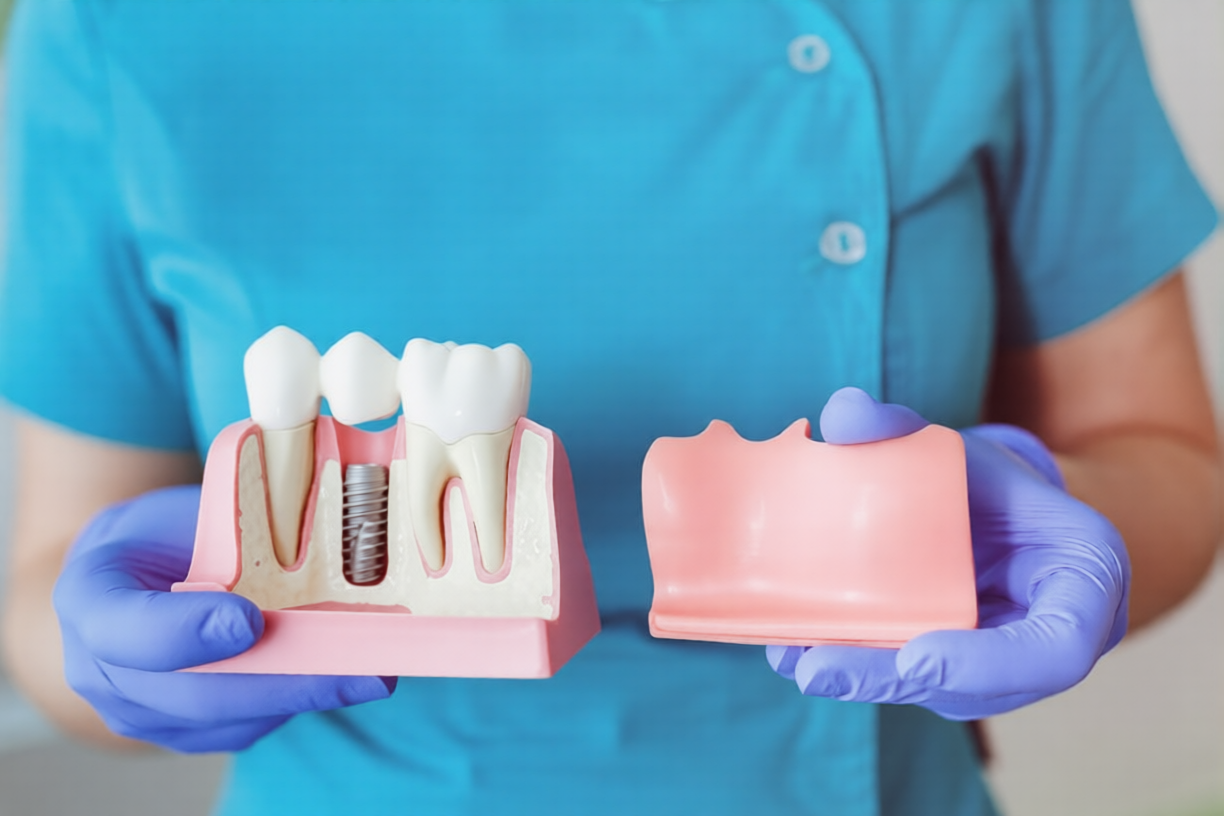Dental implants offer a long-term option for replacing missing teeth by securely anchoring artificial replacements in the jawbone. People may consider this approach to help with chewing, speaking, or addressing changes in appearance following tooth loss.
However, not everyone is automatically eligible. A dental team will assess your overall health, oral condition, and habits to determine if dental implants may be suitable for you. In Melbourne, dental practitioners adhere to strict AHPRA guidelines and Australian standards when determining whether dental implants are suitable for their patients.
If you’re asking, “Am I a suitable candidate for dental implants?”, you’re not alone. This page offers general information only. It is not intended to replace personalised advice from a qualified dental professional.
Summary of the Content:
- Dental implants are a long-term option for replacing missing teeth and require an individual assessment before treatment can begin.
- A suitable candidate should have healthy gums, sufficient bone density, good general health, and a commitment to maintaining proper oral hygiene.
- The assessment process includes a review of medical history, an oral examination, diagnostic imaging, and a discussion of treatment options.
- Some individuals may require preparatory treatments, such as bone grafting, sinus lifts, or gum therapy, to support safe implant placement.
- Factors that may affect suitability include uncontrolled medical conditions, active gum disease, poor oral hygiene, severe bone loss, smoking, and certain medications.
- Age is also considered, and implants are usually placed after jaw growth has completed.
- Clinics in Melbourne follow strict AHPRA and ADA guidelines to assess candidacy and plan treatment.
- The decision to proceed with dental implants is always made based on a personalised assessment and lifestyle factors.
What Does Being a Suitable Candidate for a Dental Implant Procedure Mean?
Being a suitable candidate for a dental implant procedure means that your oral and general health can support safe treatment and long-term function. This includes having sufficient bone in the jaw, stable gum tissue, and well-managed medical conditions. Suitability is not automatic and is continually assessed on an individual basis to help reduce risks and support healing.
A suitable candidate typically meets the following criteria: healthy gums, adequate bone density, good overall health, and a commitment to maintaining consistent oral hygiene. These factors help create the ideal environment for implant placement, support healing, and minimise the risk of complications, such as implant failure.
During your initial consultation, the dental team will conduct a comprehensive assessment. This includes reviewing your medical history, examining your mouth, and using diagnostic imaging to evaluate your jawbone and surrounding structures. They can then decide if dental implants are suitable or if they require any preparatory care beforehand.
Key Assessment Criteria Dentists Consider
If you’re wondering whether you’re a suitable candidate for dental implants, several key factors will be assessed during your consultation. These criteria help determine if implants can be placed safely and are likely to function well over time.
Jawbone Density and Volume
To hold a dental implant post securely, your jaw must have enough bone volume and strength. Without sufficient bone density, the implant may not properly integrate with the jawbone. Dentists often use advanced imaging, such as CBCT scans, to assess your bone structure in detail. If your jawbone has thinned due to tooth loss, bone grafting or a sinus lift may be considered to strengthen the area before implant placement.
Healthy Gums
Healthy, stable gum tissue is essential for supporting the implant post and reducing the risk of implant failure. If you have active gum disease, it must be managed first before considering dental implant treatment. Healthy gums support implant placement and help stabilise the surrounding areas, including nearby teeth and soft tissues.
General Health and Medical Conditions
Medical factors can influence healing and treatment planning. Conditions such as uncontrolled diabetes, heart disease, or autoimmune disorders don’t necessarily rule out dental implant treatment, but they must be carefully managed. A detailed health review helps guide treatment planning in a way that considers safety and identifies any risk factors.
Age and Growth Considerations
Dental implants are usually placed after jaw growth has completed, typically by the late teens or early twenties. However, older adults in good health can also be suitable candidates, even if tooth loss occurred years ago. The focus is on bone quality, gum health, and ability to maintain ongoing care, not age alone.
Lifestyle Factors
Lifestyle habits, such as smoking, can affect how the jaw heals after implant surgery. Tobacco use may increase the risk of implant failure and reduce long-term success. Proper oral hygiene practices must be observed. These include brushing twice a day, flossing, and attending regular dental checkups, which are essential throughout the process. Your dental team may recommend changes or support strategies to help improve the outcome.
What Happens During a Dental Implant Placement Assessment in Melbourne
Before recommending dental implant treatment, your dental team will carry out a detailed assessment to determine whether you meet the clinical criteria for implants. This process is guided by the safety standards set by the Australian Dental Association (ADA) and AHPRA.
No decision is made without a complete evaluation of your oral health, medical history, and personal circumstances. Here’s what to expect during a typical dental implant placement assessment:
- Medical history review:
Your dental team will ask about health conditions such as diabetes or heart disease, and medications that may affect your healing process. Understanding your overall health helps identify risks and guides safe treatment planning. - Oral examination:
The dentist will assess your gums, existing teeth, and jaw alignment to determine the overall health of your oral cavity. Signs of gum disease, infection, or bite issues often require treatment before proceeding with implant placement. - Diagnostic imaging:
Digital X-rays and CBCT scans are used to check your jawbone’s density, structure, and the location of surrounding teeth. These images help guide precise implant positioning and highlight the need for any preparatory treatment, such as bone grafting. - Treatment planning discussion:
You’ll receive information about whether you’re a suitable candidate for dental implants and what steps may be involved. This session may include addressing gum disease, discussing timelines, or exploring other tooth replacement options if needed.
When Additional Treatments May Be Needed First
Some patients require additional care before beginning the dental implant process. These steps help create the right conditions for implant stability and healing.
If you’re wondering, ‘Am I a suitable candidate for dental implants?’, a dentist will assess whether any preparatory care is needed. They are common and often part of the overall plan to support safe and successful outcomes. Common preparatory treatments may include the following:
- Bone grafting:
If there’s been bone loss due to tooth loss or gum disease, a bone graft may help rebuild the area for implant placement. This provides a more stable foundation for the implant post, improving long-term integration. - Sinus lift:
For implants in the upper jaw, a sinus lift may be recommended if there isn’t enough bone height below the sinus cavity. This helps create enough space to hold the implant securely. - Gum therapy:
If active gum disease or inflammation is present, gum treatment is usually recommended first. Healthy, stable gum tissue is essential for supporting the artificial tooth and protecting surrounding structures.
Bone Grafting as a Step Towards Implant Suitability
In some cases, bone grafting may be recommended before initiating the dental implant process. This step helps rebuild areas of the jaw where bone has been lost due to tooth loss, gum disease, or injury. A stable foundation is essential for successful implant placement. If the jawbone lacks sufficient density or volume, placing an implant may not be possible without first strengthening the area.
Bone grafting is a well-established procedure commonly used to prepare the site for future implants. It involves placing graft material into the area where the implant post will eventually be placed. Over time, this material encourages new bone growth and supports the stability of the implant.
If you’re being assessed for dental implants, your dentist in Melbourne may use CBCT imaging to evaluate your bone structure. They’ll explain whether bone grafting is needed, what’s involved, and how it may support long-term treatment success.
Who Might Not Be Suitable for Dental Implant Treatment?
While dental implants are a widely used option for replacing missing teeth, they may not be suitable for everyone. Suitability is assessed on a case-by-case basis, and in some situations, implants may not be recommended due to safety concerns or reduced likelihood of success. A thorough consultation is always required before a decision is made. Below are some factors that may affect whether dental implant treatment is suitable:
- Severely uncontrolled medical conditions:
Conditions such as advanced diabetes, blood-clotting disorders, or immune system suppression may impact healing after implant surgery. These issues must be carefully managed before considering dental implants. - Inability to maintain oral hygiene:
Proper daily oral care, including brushing, flossing, and regular dental checkups, is essential. Patients unable to maintain consistent hygiene may be at higher risk of implant failure or infection. - Active gum disease or unmanaged periodontal conditions:
Active gum disease can compromise the surrounding tissue and bone that support the implant post. These conditions must be addressed before implant placement. - Heavy smoking or tobacco use:
Smoking can slow the healing process and may interfere with the bone’s ability to integrate with the implant. Patients who smoke heavily may be advised to reduce or discontinue before undergoing dental implant treatment. - Severe bone loss without viable grafting options:
If there is significant bone loss and bone grafting is not possible or likely to be successful, implants may not be recommended. This is especially relevant in cases of long-term tooth loss or trauma. - Uncontrolled teeth grinding (bruxism):
Constant grinding can place excessive pressure on the implant and surrounding bone tissue, increasing the risk of complications. - Certain medications:
Some medications, such as high-dose steroids, can affect bone metabolism or healing. Your complete medical history will be reviewed during the initial consultation. - Jaw not fully developed:
For younger patients, implants are generally delayed until after the jaw has finished growing. Placing an implant too early may affect alignment or long-term function.
Severe dental anxiety that affects treatment compliance: In some cases, high anxiety may prevent a person from completing the required steps in the implant process. Options like sleep dentistry may be discussed if appropriate.
Final Thoughts
Suppose you’ve been wondering, “Am I a suitable candidate for dental implants?”. In that case, the answer depends on a combination of your oral condition, general health, and ability to maintain long-term care. Dental implant treatment is not a one-size-fits-all procedure. Each patient is assessed individually to determine if implants are an appropriate and safe option for replacing missing teeth.
Being a good candidate means you have healthy gums, adequate bone structure, and no unmanaged health conditions that could interfere with healing. Dental implants also require a long-term commitment to maintaining good oral hygiene, including daily brushing, flossing, and regular dental checkups. These habits support the health of both your natural teeth and the implant over time.
You may still be considered for dental implant treatment even if you have specific factors such as bone loss, gum disease, or certain health conditions. In many cases, additional procedures such as bone grafting or gum therapy can help improve the chances of a successful outcome. A thorough consultation helps identify what’s needed before treatment begins.
In Melbourne, dental professionals follow strict clinical guidelines set by the Australian Dental Association (ADA) and AHPRA. This approach supports your safety, overall health, and long-term oral function throughout the assessment and treatment planning process. Advanced diagnostic tools, such as CBCT scans, enable practitioners to assess your jawbone density, identify potential concerns, and create a personalised plan tailored to your specific dental needs.
Whether you’re exploring options for a single tooth, several missing teeth, or a more stable alternative to traditional dentures, dental implants may be a viable option. The first step is a detailed consultation to help you understand whether this treatment is a good fit for your situation.
If you’d like to explore your options, consider booking a consultation at The Dental Co. Your dental team will guide you through the process and help determine if the procedure is a suitable option based on your needs.







